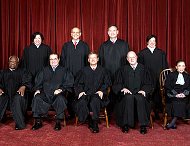Article from: www.thenewspaper.com/news/43/4376.asp
4/4/2014
California Man Takes Red Light Cameras To US Supreme Court
California man asks US Supreme Court to consider Confrontation Clause argument against red light cameras.
 Of the thousands of petitions for appeal presented to the US Supreme Court each year, less than four percent are accepted for review. Of those accepted, none have ever been about photo enforcement. Howard Herships hopes his constitutional argument against the use of red light cameras will be the first to make it to the nation's highest court. Herships appealed after the California Supreme Court turned away his case in December, deciding instead to review two similar case. The California court heard oral arguments in the first case, California v. Goldsmith (view opinion), on Thursday.
Of the thousands of petitions for appeal presented to the US Supreme Court each year, less than four percent are accepted for review. Of those accepted, none have ever been about photo enforcement. Howard Herships hopes his constitutional argument against the use of red light cameras will be the first to make it to the nation's highest court. Herships appealed after the California Supreme Court turned away his case in December, deciding instead to review two similar case. The California court heard oral arguments in the first case, California v. Goldsmith (view opinion), on Thursday.
"If the California Supreme Court affirms People v. Goldsmith and People v. Borzakian (view case) then the US Supreme Court will grant my writ of cert," Herships told TheNewspaper. "However, if the California Supreme Court reverses People v. Goldsmith then the US Supreme Court will reverse and remand in light of back to the California Supreme Court.
At issue in all of these cases is whether the Sixth Amendment right of a defendant to confront the witness against him allows a police officer to testify about red light camera evidence even though he has absolutely no direct knowledge about the facts of the case. Unlike most other states, California does not treat photo ticketing charges as a civil matter where due process rights are reduced.
The Goldsmith appellate decision said an officer could testify by reading the printout supplied by companies like Redflex, but the Borzakian appellate decision came to the opposite conclusion. Rather than wait to have the high court resolve the split in the Court of Appeal, Redflex wrote a new law, which the California legislature duly enacted in 2012, modifying the rules of evidence to deem photo ticketing evidence automatically reliable.
Herships insists the state cannot pass a law to eliminate a defendant's constitutional right to confront the witnesses against him, namely the actual Redflex technician who verified the image used to send him a $500 ticket. Allowing a "surrogate witness" to testify in court, he argues, violates recent Supreme Court rulings interpreting the Confrontation Clause, including Bullcoming v. New Mexico (view opinion) and Melendez-Diaz v. Massachusetts (view case). Herships cites the 2004 Crawford v. Washington case on this point.
"The Constitution prescribes a procedure for determining the reliability of testimony in criminal trials, and we, no less than the state courts, lack authority to replace it with one of our own devising," Justice Antonin Scalia wrote.
Herships also argued he was denied equal protection under the law when the California Supreme Court decided to review two other cases on the same subject while denying his claim. The US Supreme Court will decide whether to accept this case by April 18.
 Of the thousands of petitions for appeal presented to the US Supreme Court each year, less than four percent are accepted for review. Of those accepted, none have ever been about photo enforcement. Howard Herships hopes his constitutional argument against the use of red light cameras will be the first to make it to the nation's highest court. Herships appealed after the California Supreme Court turned away his case in December, deciding instead to review two similar case. The California court heard oral arguments in the first case, California v. Goldsmith (view opinion), on Thursday.
Of the thousands of petitions for appeal presented to the US Supreme Court each year, less than four percent are accepted for review. Of those accepted, none have ever been about photo enforcement. Howard Herships hopes his constitutional argument against the use of red light cameras will be the first to make it to the nation's highest court. Herships appealed after the California Supreme Court turned away his case in December, deciding instead to review two similar case. The California court heard oral arguments in the first case, California v. Goldsmith (view opinion), on Thursday.